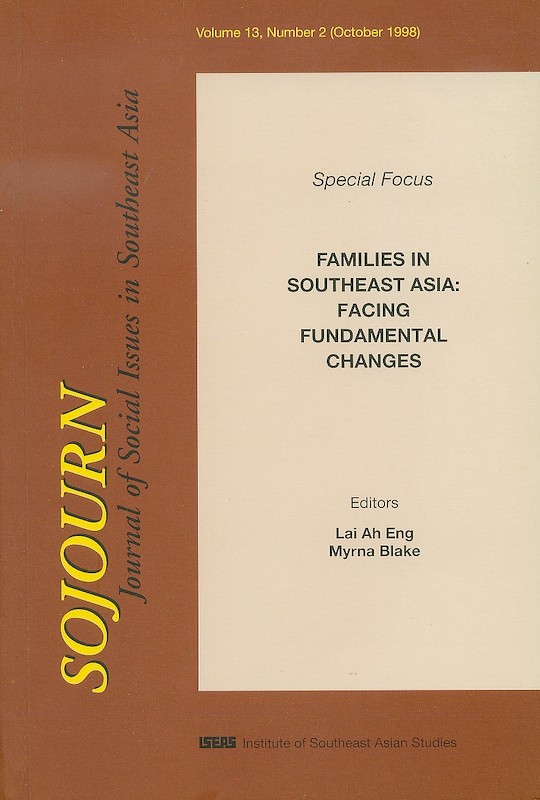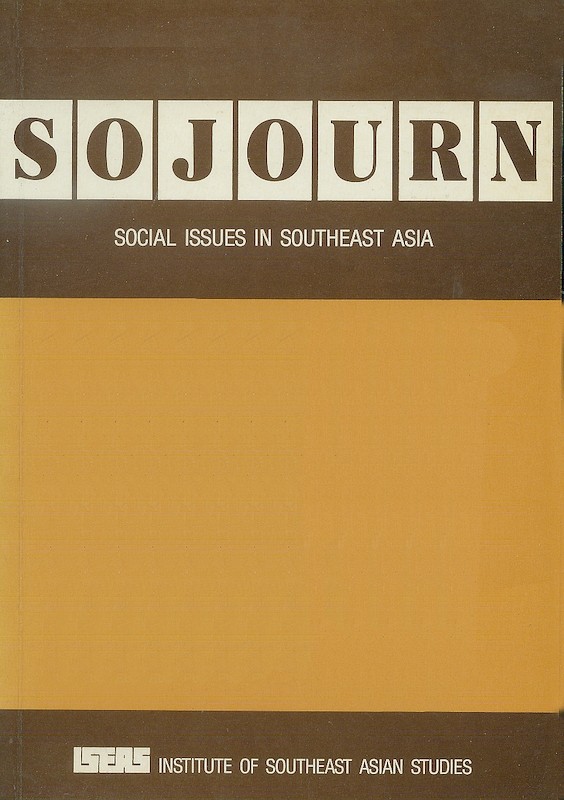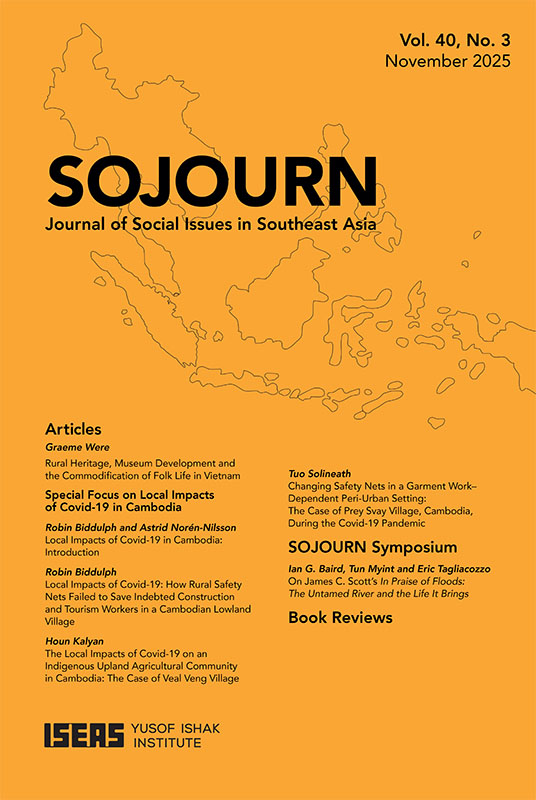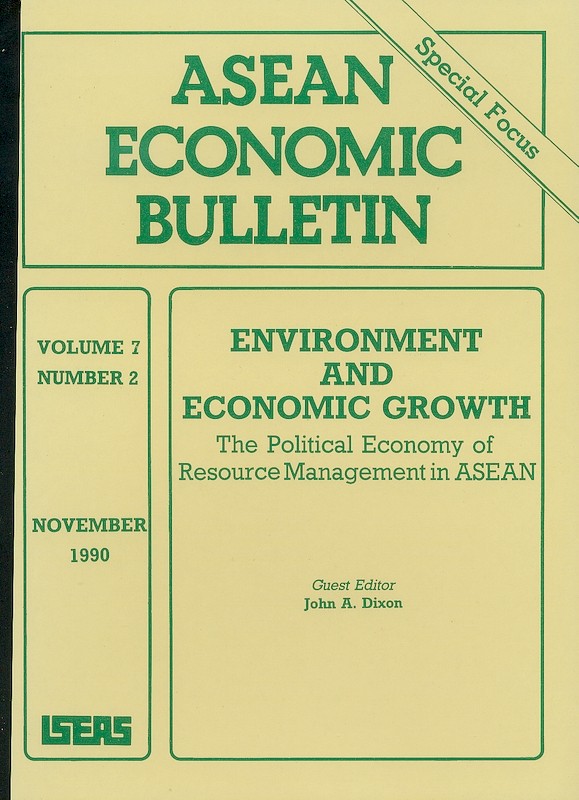SOJOURN: Journal of Social Issues in Southeast Asia Vol. 26/2 (October 2011): Special Focus on Social Structure and Differentiation in Contemporary Laos
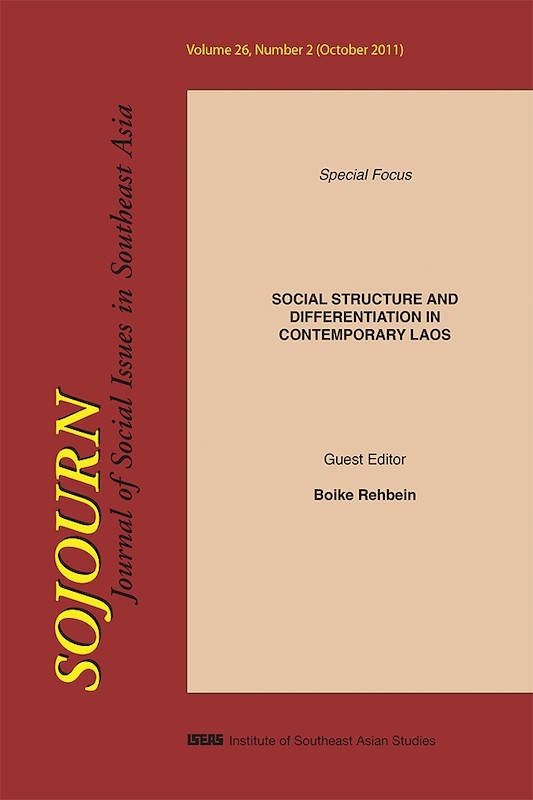
Boike Rehbein, editor
Date of publication:
October 2011
Publisher:
Institute of Southeast Asian Studies
Number of pages:
180
Code:
SJ26/2
Contents
-
SOJOURN: Journal of Social Issues in Southeast Asia Vol. 26/2 (October 2011): Special Focus on Social Structure and Differentiation in Contemporary Laos
[Whole Publication] -
Preliminary pages
-
Introduction, by Boike Rehbein, author
- SPECIAL FOCUS
-
Memory, Tourism, and Development: Changing Sociocultural Configurations and Upland-Lowland Relations in Houaphan Province, Lao PDR, by Oliver Tappe, author see abstractHouaphan Province is a peripheral upland region typical for Laos: ethnically heterogeneous, largely rural, economically marginal. Yet recent tendencies of state intervention, upland-lowland relations, and transnational dynamics make the province a special case for the study of Lao upland contexts. Three aspects of these tendencies shall be explored here: state-controlled memory and history politics in the context of ideological nation building, transnational tendencies as embodied by the tourism sector, and upland development politics directed by the state and international agencies. Examples from Viengxay, important revolutionary site of memory and tourism destination, and the surrounding rural areas affected by modernizing development projects will illustrate present sociocultural transformations in upland Laos.
-
The Genesis and Demarcation of the Religious Field: Monasteries, State Schools, and the Secular Sphere in Lao Buddhism (1893-1975), by Patrice Ladwig, author see abstractUntil the 1950s Lao monks and monasteries still had a crucial role in providing education for large parts of the population. With an increasing encroachment of the state, however, educational politics shifted towards the establishment of a state school system and marginalized the monks' role in public education. The training in monasteries became increasingly linked to a separate, religious field. This article explores the implications and dynamics of these processes with regard to Bourdieu's theory of differentiation of the religious field and contemporary discussions of secularization. By employing a historical perspective spanning from the colonial period to 1975, the article explores the emergence and the shifting boundaries of the religious field. Largely focusing on institutional structures, I argue that through functional differentiation we witness a demarcation of a religious field and a simultaneous emergence of a secular sphere.
-
Differentiated Origins: Trajectories of Transcultural Knowledge in Laos and Beyond, by Guido Sprenger, author see abstractEthnicity belongs to the most important types of differentiation in Laos. Among the means to establish such differences is the ascription of bodies of knowledge to various ethnicities. Ritual healing knowledge is often associated with the foreign and the culturally different. The attribution of differentiated categories of foreignness thus supports the emergence and reproduction of ethnic differentiation and interethnic communication in this region. This article compares ritual healing among Rmeet in Laos, Karen in Thailand, and Iu Mien in both countries in respect to the ethnotopography of its origins.
-
Processes of Social Differentiation and (Re-)Integration in Northern Laos, by Andrea Schopohl, author see abstractThe Lao Government supports different development strategies for the improvement of rural livelihoods within the country. In order to understand the deep transformations effected by these strategies, it is necessary to analyse their impact from the emic perspective of the target groups. As an important "gate to modernity", a source of luxury goods, and an entrance to education and modern health care, the new Highway No. 3 plays an increasing role in the daily lives of the Khmu in Northern Laos. This paper deals with the question, in which way modern structures and institutions are used to enhance people's spiritual and economic well-being. It argues that the Khmu are able to localize the impact of the highway to enhance their lives without losing their own cultural identity.
-
Differentiation of Sociocultures, Classification, and the Good Life in Laos, by Boike Rehbein, author see abstractWhy should we study social inequality? One of the reasons is that some people seem to be in the position to lead a better life than others. This paper interprets inequality both as horizontal and vertical differentiation. It focuses on the unequal distribution of options to lead a life reckoned good by Lao society. Social differentiation of options to lead a life reckoned good by Lao standards has increased rapidly over the past twenty years. At the same time, standards of a good life themselves have become increasingly differentiated. The definition of social standards is dominated by the ruling party, but it is not its monopoly anymore, as social struggles and differentiation extend to the symbolic sphere. Against the background of a historical sketch of Lao social structure, this paper discusses present social and symbolic differentiation in order to understand the differentiation of standards and options of a good life in Laos.
- ARTICLE
-
Working in the Islamic Economy: Sharia-ization and the Malaysian Workplace, by Patricia Sloane-White, author see abstractThis article demonstrates how sharia, the source for developing products in Malaysia's Islamic economy, has also emerged in some Malaysian businesses as a form of corporate culture, reconfiguring workplace identities and social relations. It takes the form of what I call "corporate sharia", a set of ideas consciously and deliberately shaped by executives who seek to build corporations based on the rules for commerce and management contained within the Qur'an and Hadith. Corporate leaders also fashion what I call "personnel sharia" "human resources" rules to ensure that employees exhibit the ethical values and moral principles set by their superiors. As such, the "Islamic workplace" becomes sharia-ized, where the piety and Islamic subjectivities of personnel are shaped, monitored, and enforced, not left to individual, personal choice.
- BOOK REVIEWS
-
BOOK REVIEW: Pop Culture Formations across East Asia edited by Doobo Shim, Ariel Heryanto and Ubonrat Siriyuvasak, by Brenda Chan, author
-
BOOK REVIEW: Leaves of the Same Tree and Ethnicity in the Straits of Melaka by Leonard Y. Andaya, by Rusaslina Idrus, author

